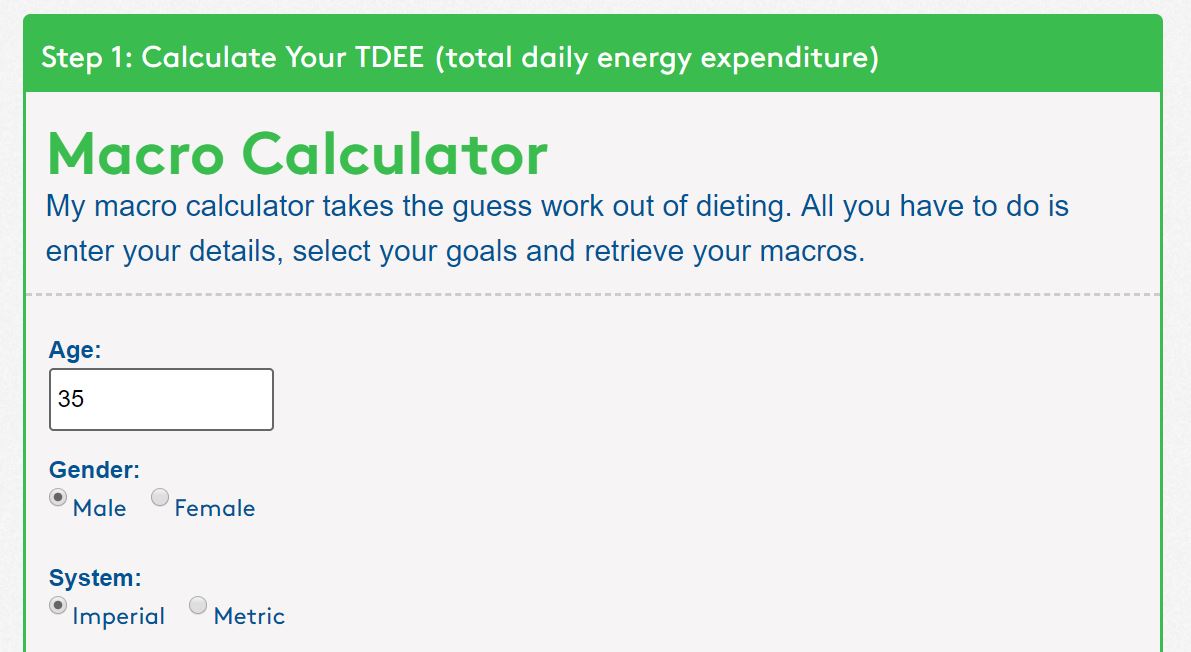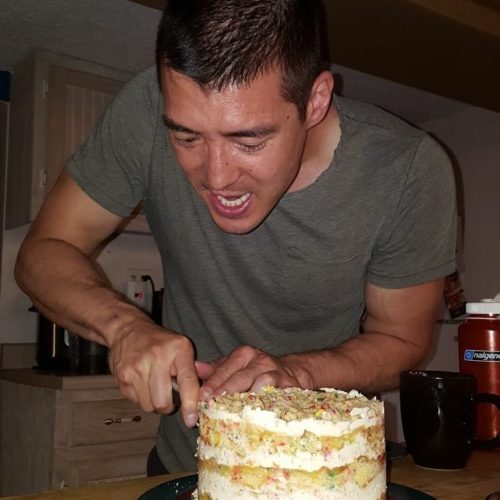
How to start eating intuitively: Intuitive eating 101.
Read time: 10-15 minutes.
Wouldn’t it be nice if we could all just eat intuitively and have the bodies we desired?
That we didn’t have to think and obsess about food all the time?
That we could naturally choose foods for our bodies that supported health and longevity?
It would be nice, and it definitely is possible.
What’s required is taking a step back from most everything you’ve learned about food, learning some basics, and educating yourself through practice and awareness.
Just like there are tons of fitness programs and different types of training, this method of learning to eat intuitively is one among many others.
I believe in it and it has worked for myself and my clients and I hope it can work for you.
What is intuitive eating?
Intuitive eating (defined by me) is eating in a manner that supports health and vitality while maintaining a healthy body weight.
Most people think the ability to intuitively eat is something you either have or you don’t.
They don’t realize that it’s a learned skill.
Most of the people who eat intuitively have spent many months or even years learning about food, how different types of food interacts with their bodies, and how it makes them look and feel.
Google “how to intuitively eat” and read the articles. They are written by nutritionists, registered dietitians, and people in the fitness industry (people who have spent years studying food).
Unfortunately, most of the suggested advice is vague. Like “bring awareness around to what you’re eating.”
WTF does that mean? How do you do that?
While that’s not bad advice, what’s missing is the practical actionable steps to get you there.
In my experience, the ability to intuitively eat comes from food education, food awareness, and from trial and error from eating all kinds of foods.
So what does it take for YOU to build the skill of intuitive eating?
PRACTICE.
Despite what Allen Iverson says, practice is important 🙂
You don’t have to be naturally intuitive around food, you just need consistent practice at it.
Let’s look at the Merriam Webster definition of intuition…
Definition of intuition
1 : quick and ready insight
2 : immediate apprehension or cognition
How do you have “quick and ready insight” when it comes to choosing healthy foods your body thrives on?
PRACTICE through educating yourself about food and how those foods interact with your body.
How do you have “immediate apprehension or cognition” when it comes to not overeating?
PRACTICE through tracking your food, eating it, and paying attention to satiety (fullness) levels.
Don’t believe me?
Think of something you’re really good at. Something that is on autopilot. Something you could say you’re intuitive at.
How did you get there?
You can bet it was practice doing it over and over again for months or even years.
Intuition draws from the knowledge you have gained in the past about a particular subject that now comes second nature to you.
Why Intuitive Eating Is Important…
Intuitive eating is important because you’ll…
- know and understand food.
- be in control when it comes to food.
- be able to handle social situations without feeling guilty.
- gain mastery over your health and physique for life.
- be able to intuitively eat for weight loss (fat loss), maintenance (maintain your weight), or even weight gain (muscle gain) with little effort.
The 4 Foundational Pillars Of Understanding For Intuitive Eating
1. Understand the truth about all diets
I’m not against popular diets. They do work when followed, but they often don’t educate the dieter on what’s actually going on. Instead, they mainly rely on labeling foods as “good and bad”, or “have and can’t have.”
This can lead to an unhealthy relationship with food.
The reason why diets work when followed is that they ALL restrict certain foods or even whole macronutrient (protein, carbs, and fat) groups which creates a caloric deficit.
A caloric deficit simply means eating less than your body needs to maintain its current weight.
When you subtract foods that you normally eat out of your diet, it’s much easier to maintain eating less because you have less to choose from. The diet provides a system and structure to follow.
So, when someone you know says they tried “blank” diet and they lost a ton of weight, it’s not the “magic” of that diet that helped them lose weight. It was that they found a method of eating that worked for them and they consistently ate in a caloric deficit over time.
If diets were magical for fat loss, then there wouldn’t be so many.
Let’s look at the Low-fat diet. It works because dietary fat is reduced which creates a caloric deficit. If the low-fat diet was magical, it would be that eating less fat and only eating less fat was the way to lose weight.
But, let’s compare the Low-fat diet with the Ketogenic diet.
The Ketogenic diet is very high in dietary fat, low-to-moderate protein, and no carbohydrates. Yet, it also works well for fat loss.
The commonality between these two diets is the caloric deficit.
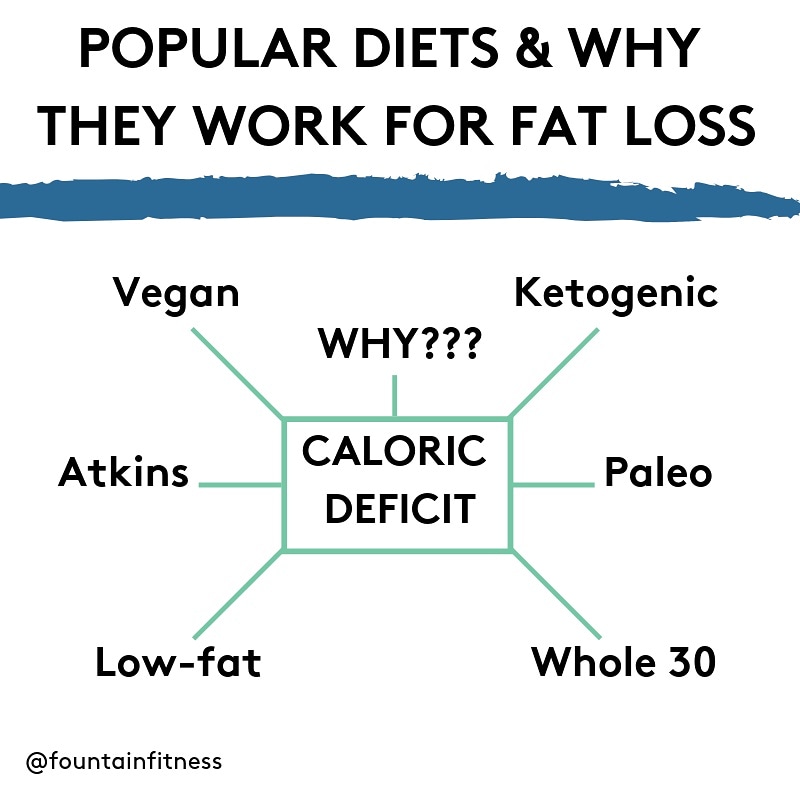
But, where diets get it wrong, is that they don’t educate the dieter on what created the weight loss. Instead, they back it up with their own statistics and success stories.
People will have success with popular diets because they work, but what often happens is that they don’t eat in that manner indefinitely. It’s usually for a goal like a wedding, vacation, summer, etc.
So, when they go back to eating the foods they were restricting, they gain some or all of the weight back and end up frustrated.
You can see now how following a certain diet without understanding how it works can create an unhealthy relationship with food.
I’m a fan of certain diets and I think they work well for many people and situations, but I want to educate you on what’s actually going on so you can have control over your body and physique no matter how you choose to eat.
2. Good and Bad Foods
Are certain foods good and other foods evil?
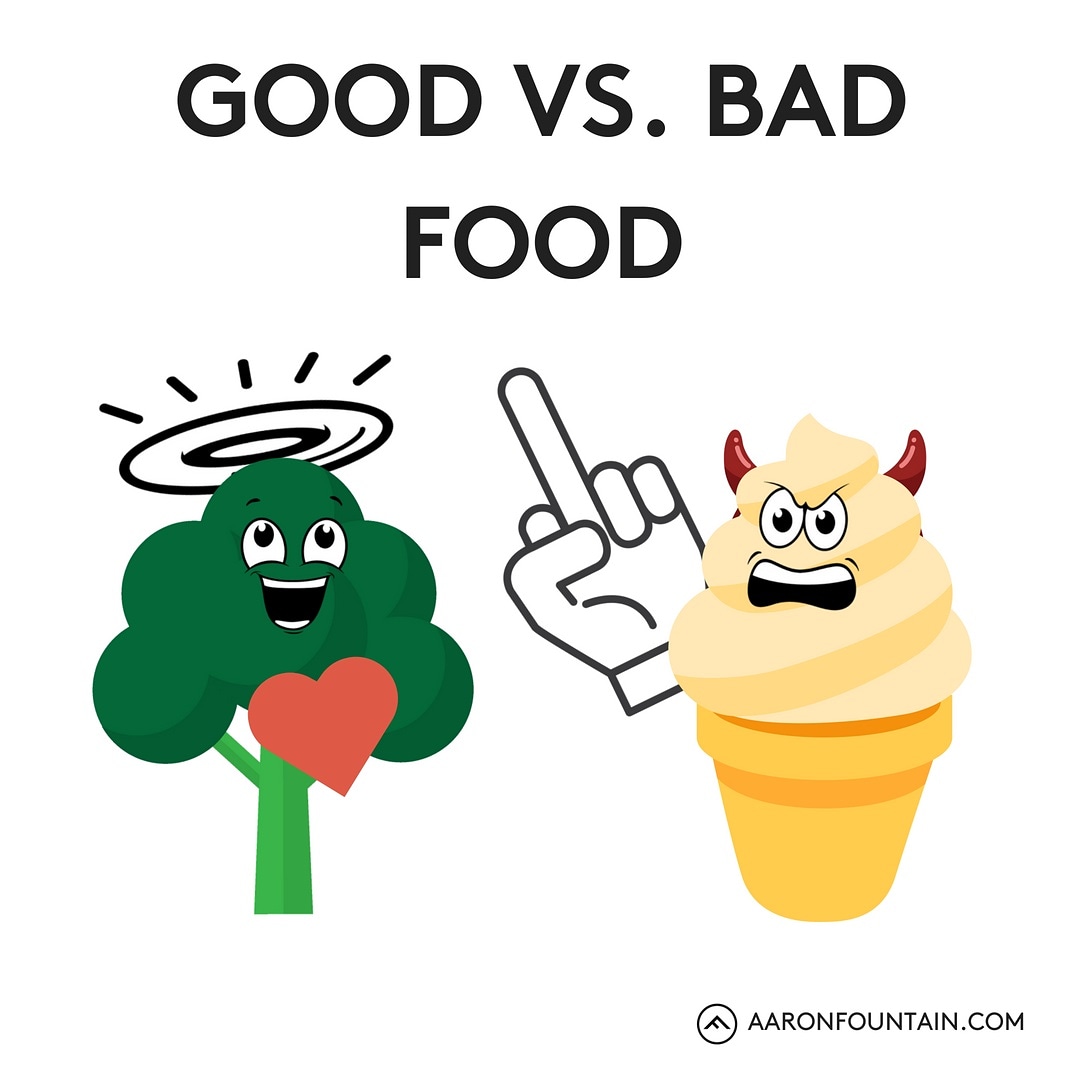
In my opinion, there are no “good” or “bad” foods. Nor does any food directly contribute to weight loss or weight gain.
There are simply foods that are more nutritious than others.
In terms of body composition (muscle vs. fat), how much you eat (calories) is more important than what you eat.
Sugar, carbs, fat, etc. (insert your “bad” food) don’t make people fat, it’s the total amount of excess calories they’re consuming that causes weight gain.
To illustrate this point, a study performed by a professor at Kansas State University ate nothing but sugary junk foods and a couple of protein shakes a day and lost 27lbs. He did this because he was in a caloric deficit.
And yes, for long-term health and leanness, a diet that is focused around whole and minimally processed food should be the foundation as well as foods that agree with your body (food intolerances).
But, labeling foods as “good” or “bad” just feeds into over-restriction, bingeing, yo-yo dieting and less food joy, not to mention shame and guilt.
3. Understand Energy Balance
Our bodies require a certain amount of energy in the form of food (calories) each day.
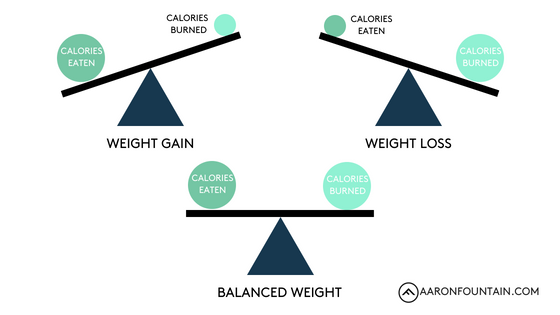
If we eat more calories than our body needs consistently, we will gain weight.
If we eat fewer calories than our body needs consistently, we will lose weight.
And, if we eat the right amount of calories for our bodies, we will maintain our weight.
Why is understanding this important?
- Any diet or method of eating will work for your goals if you understand energy balance.
- No matter how “healthy” a diet is, if you eat too much of ANYTHING, you’ll gain weight.
- It can help you get away from the mindset of “good” and “bad” foods and create a sustainable way of eating.
Calculate your daily intake needs below…
Note: Remember, any calculation for your energy needs is a guess at best. They are based on averages and may or may not be 100% accurate. The best way is to use the calculation as a starting point, and adjust from there (if needed).
4. Food Education Through Food Tracking
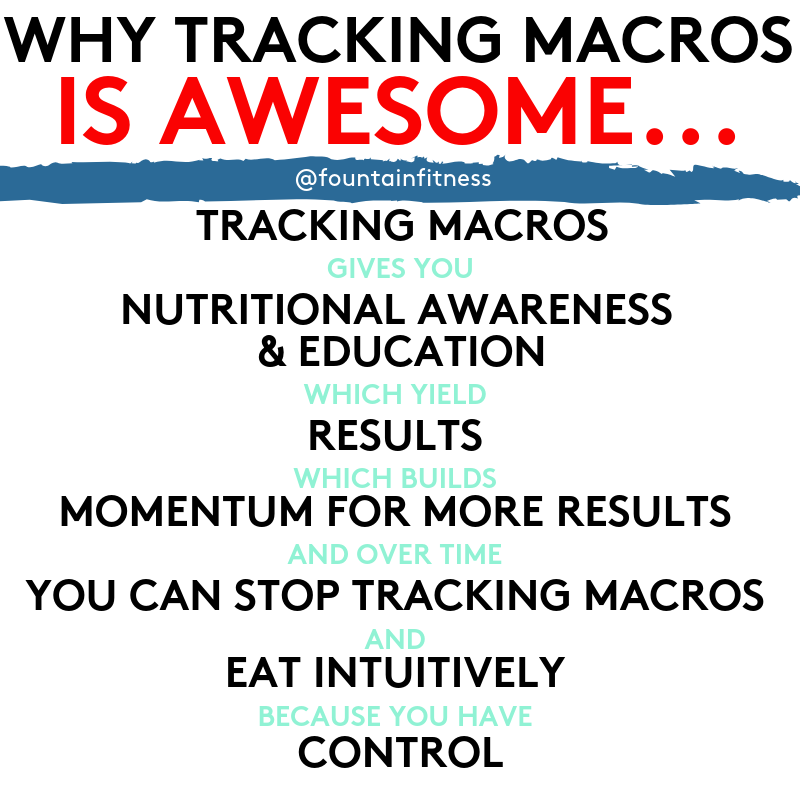
By looking at food labels, you’ll start to understand what’s in the food you eat. You’ll be able to see how many calories something has and also discover it’s macronutrient profile (carbs, protein & fat).
By using nutritional labels and weighing food with a food scale, you’ll be able to accurately eat the correct amounts for your goals.
By tracking your food with a food journal or app like MyFitnessPal, you will be inputting everything you’re eating which inherently gives you food awareness because you’re having to bring a lot of focus and detail around the food that you’re eating.
From there, it’s easy to practice and discover how you feel when you eat food, what foods work better for your body, and change your body at the same time.
Over time, this becomes second nature.
Meaning you won’t have to track your food forever.
It has become a skill.
You have looked at, tracked and eaten food over and over again.
Now you’ll be able to just look at food, know more or less what’s in it, and be able to choose wisely.
That’s intuitive eating!
How To Start On The Path Of Intuitive Eating
- Choose your goal (fat loss, muscle gain, maintenance) & calculate your energy needs.
- Focus on eating mostly whole and minimally processed foods. But, also leave room for the foods you enjoy.
- Track your food for the next 3-6 months.
- Pay attention to how certain foods make you feel as well as portion sizes.
That’s it!
That will help lay the foundation of learning about the food you’re eating.
Your food knowledge and food awareness will grow from there, which will lead to eating more intuitively over time.
Aaron’s Tips
Read my article on Flexible Dieting…
FLEXIBLE DIETING: A SIMPLE & ENJOYABLE DIET PLAN TO GET THE BODY YOU WANT
It’s really not a diet at all.
Rather, it’s an eating structure based on everything I talked about in this article and a great alternative to traditional diets which will lay the foundation for you to learn to eat intuitively.
Track your food for 3-6 months
This is a good amount of time for you to lay a solid foundation for food education.
Remember that tracking what you’re eating will help you bring awareness to your relationship with food.
When you can’t track your food, practice what you’ve learned.
There will always be situations when you don’t know what’s in the food your eating. This is a great time to practice what you’ve learned from tracking your food.
If you want to learn more about tracking your food, read my guide…
TRACKING MACROS 101: THE COMPLETE GUIDE
Enjoy yourself!
Remember it’s about what we do over the long-term, and if you “mess-up” it’s not a big deal.
It’s what you do the majority of the time that counts.
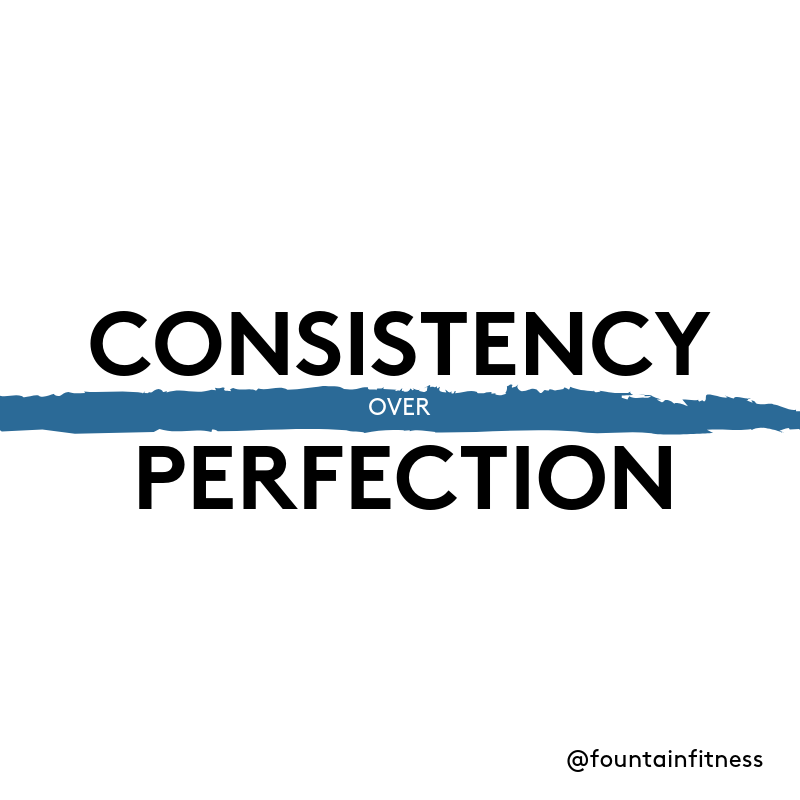
What I want for you is to build a sustainable way of eating that includes healthy eating and foods you still love.
I’m here to help!
Feel free to ask questions in the comments section below…
